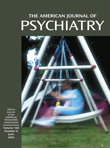Attachment and Traumatic Stress in Female Holocaust Child Survivors and Their Daughters
Abstract
OBJECTIVE: During the Holocaust, extreme trauma was inflicted on children who experienced it. Two questions were central to the current investigation. First, do survivors of the Holocaust still show marks of their traumatic experiences, even after more than 50 years? Second, was the trauma passed on to the next generation? METHOD: Careful matching of Holocaust survivors and comparison subjects was employed to form a research study design with three generations, including 98 families with a grandmother, a mother, and an infant, who engaged in attachment- and trauma-related interviews, questionnaires, and observational procedures. RESULTS: Holocaust survivors (now grandmothers) showed more signs of traumatic stress and more often lack of resolution of trauma than comparison subjects, but they were not impaired in general adaptation. Also, the traumatic effects did not appear to transmit across generations. CONCLUSIONS: Holocaust survivors may have been able to protect their daughters from their war experiences, although they themselves still suffer from the effects of the Holocaust.



